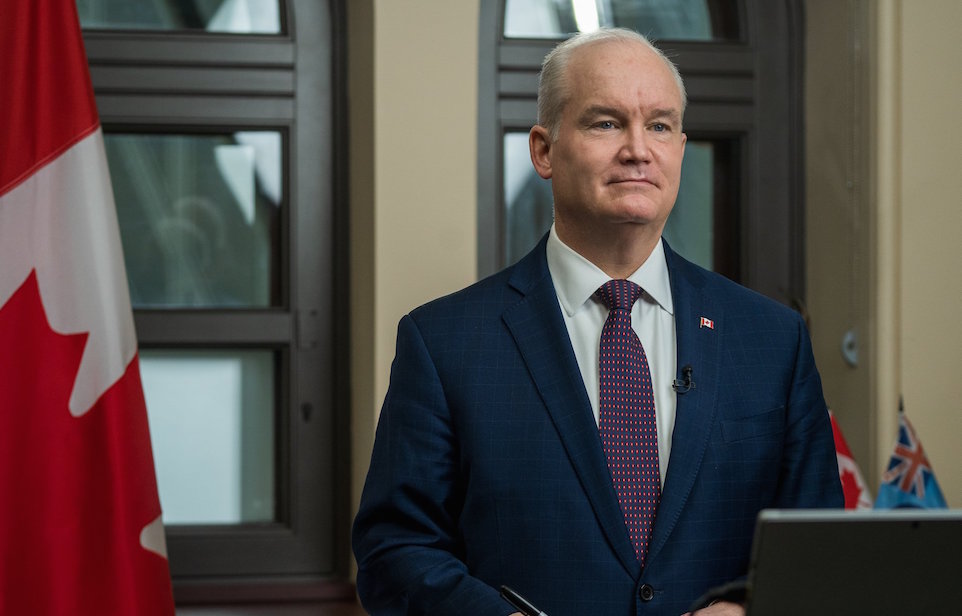Did you let out a sigh of relief when you heard Conservative Party Leader Erin O’Toole’s assertion back in March that he’s “pro-choice”? If so, you will be sorry to learn that this claim amounts to almost nothing in the battle for bodily autonomy in Canada.
Now, to give O’Toole a modicum of credit: it must have been hard (politically) to make this statement when it seems like every social conservative in the country is leaning on you to either a) less-than-artfully dodge the question like Andrew Sheer did so many times or b) claim that you are going to restrict reproductive justice in some way. When I first heard O’Toole say he was pro-choice, I was, admittedly, surprised. Not because a fiscally conservative person cannot have socially liberal values, but because of how many anti-choice advocates are part of the Conservative Party, whom O’Toole has likely angered.
That being said, while O’Toole is claiming to be pro-choice, he voted in favour of Bill C-225 in 2016, which would have assigned fetuses personhood. Even if his views on this have changed, his assertion still does not mean restricting abortion rights is off the table if he wins an election. This claim smells more like voter appeasement than standing up for reproductive rights.
What fiscally conservative but socially liberal (FCSL) voters might not consider is that O’Toole can say he is pro-choice until he is “true blue” in the face, but this does not mean his party will not enact anti-choice legislation. Even if O’Toole keeps to the established Conservative policy pledge — that a future government “will not support any legislation to regulate abortion” — it does not stop members from issuing private member’s bills in this regard.
A private member’s bill is a proposed law introduced into the legislature by an MP who is not acting on behalf of the executive branch. If anyone produced a bill of this type (likely a Conservative Party member), O’Toole could then vote against it to show he is not going back on his word, but other party members could still vote for it.
O’Toole may actually believe everyone has the right to an abortion, but I have a suspicion he is trying to placate fiscally conservative but socially liberal voters without completely alienating the anti-choicers who back the party.
There is already precedent for this. A private member’s bill to ban so-called “sex-selective abortion” has been brought forth. O’Toole stated he would vote against it, but he is allowing a free vote for his shadow cabinet.
This shows that O’Toole’s claim of being pro-choice is a strategy for votes. Until he states definitively that no member of the party is allowed to vote for a bill that undermines reproductive justice, we cannot be sure the right to abortion is safe in this country. If the Conservative Party were to be a majority government, then a private member’s bill would have the potential to pass, especially with O’Toole’s cabinet having a free vote. In contrast, the Liberals and NDP aren’t allowed to vote openly on this issue (and the Green Party came under fire a few years ago for allowing it).
Anti-choice groups have gone to great lengths to weasel their one belief into being near-synonymous with the Conservative Party. Thankfully, the recent Conservative Party convention refused to talk about the issue, much to anti-choice groups’ disdain.
The anti-choice proponents in the Conservative Party were hoping not just to discuss abortion at the convention, but to modify the Conservative Party’s constitution to: “officially embrace the sanctity of all human life ‘from conception to natural death.'”
The main proponent of this change is the Campaign Life Coalition (who not only oppose abortion, but euthanasia, stem cell research, same-sex marriage, gender identity legislation, and infertility treatments for couples unable to conceive). They claim they fulfilled a requirement to obtain 100 delegate signatures from different ridings in order to show there was support to discuss the amendments. Unfortunately for them, “motions from the floor [were] not permitted” at the convention, so the amendments were not considered.
In response, the Campaign Life Coalition claimed, “our voice is being suppressed.” I am unapologetic about the schadenfreude that this gives rise to in me, given how their goal is to suppress the rights of others. I also cannot stop myself from hoping that this “suppression” will force anti-choicers to leave the Conservative Party to form their own fringe party, which would, hopefully, leech away the anti-choice voice and let the Conservative Party progress.
There’s one thing the pro-choice parties in Canada (Liberal, NDP, and Greens) could do to enshrine reproductive rights in our country, and that’s to codify abortion as a human right in our Human Rights Code (specifically under the right to be free from discrimination due to sex), so it can’t be up to interpretation. Quite frankly, I don’t know why they haven’t tabled this already.
Tina Beier is a freelance writer, an award-winning novelist, and a volunteer blog coordinator with the Abortion Rights Coalition of Canada. She lives in Ontario and champions the causes of women’s rights, animal welfare, and the environment.
Viewpoint: Reproductive Justice is a blog by the Abortion Rights Coalition of Canada.
Image credit: Erin O’Toole/Facebook



